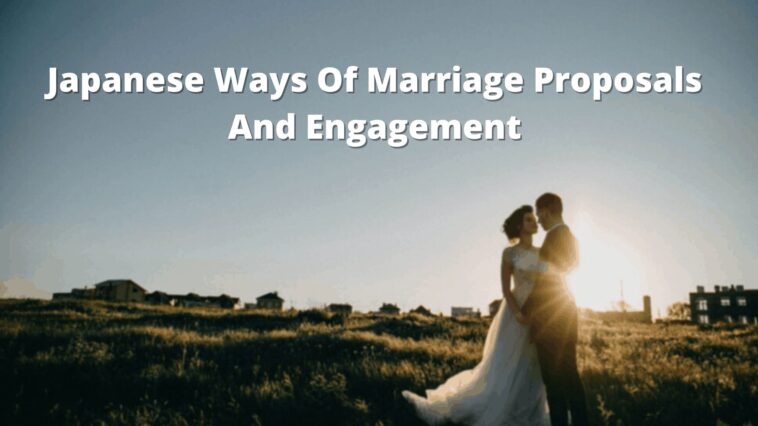How are marriage proposals and engagement different in Japan from the rest of the world? Well, here’s a bull-eye explanation on the same, check it out!
In Japan, the journey from courtship to marriage is steeped in rich traditions that distinguish it from Western practices.
Understanding the nuances between marriage proposals and engagements is key to appreciating the cultural significance behind these rites of passage. Explore the unique customs that shape Japanese relationships and weddings.
Page Contents
How Are Marriage Proposals And Engagement Different In Japan?
In Japan, marriage proposals and engagements differ from Western customs. Marriage proposals are typically more intimate and private, with the decision to marry being a mutual one rather than a formal request from one partner to the other. Unlike elaborate surprise proposals, Japanese couples usually have a more understated moment when they decide to marry.

Engagements, while not always a mandatory part of the process, may involve a traditional meeting called “yuinou,” during which representatives of the bride and groom exchange gifts to symbolize the union of their families and discuss wedding arrangements.
However, many modern couples forego the official engagement period and directly start preparing for the wedding once they decide to marry.
While some Japanese couples may adopt Western-style proposal and engagement elements, traditional customs still play a significant role in shaping marriage practices in the country.
Related: Check out how are weddings different in Japan, here!
How are Engagements (Yuinou) different in Japan compared to the West?
In Japan, engagements are not always an essential part of the marriage process, and many couples choose not to have an official engagement period. Instead, once the couple has mutually agreed to marry, they often start preparing for the wedding directly.
However, in traditional Japanese weddings, there is a custom called “yuinou,” which can be considered somewhat similar to an engagement.
It is a formal meeting between representatives of the bride’s and groom’s families, where they exchange gifts as a way to symbolize the union of the two families. The gifts may include traditional items like sake, sea bream, and dried cuttlefish, which have auspicious meanings in Japanese culture.
During the yuinou, both families also discuss the wedding date, location, and other important aspects of the upcoming ceremony. This meeting is more of a formality and confirmation of the couple’s decision to marry, rather than a proposal in the Western sense.
How Are Marriage Proposals (Kekkon Teian) Different In Japan Compared to the West?
In Japan, marriage proposals are less elaborate and formal compared to some Western cultures. Instead of a grand, surprise-filled event, they are usually a more intimate and private affair between the couple.
The proposal is often a mutual decision, and the couple discusses their intentions to get married rather than one partner formally asking the other for their hand in marriage.
In modern Japan, some couples may still have a romantic moment when they decide to marry, but it is generally more low-key than what is commonly seen in Western movies or TV shows.
- Size Doesn’t Matter to the Japanese
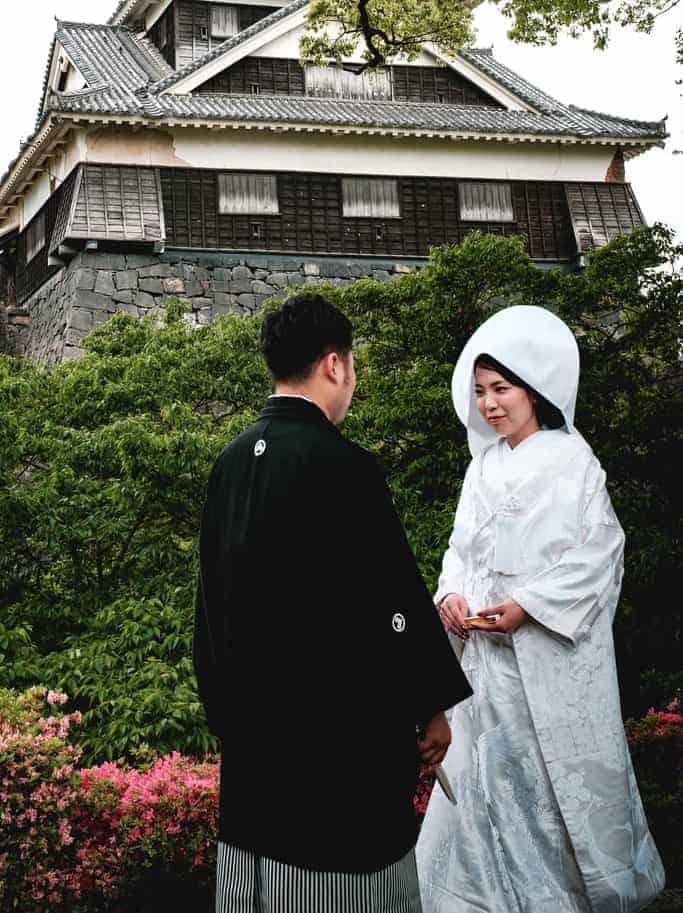
One of the biggest differences I noticed between the west and the Japanese proposal traditions is that the size of the event doesn’t matter to them.
Usually in the west, marriage is a very grand concept or is often displayed to be so.
In countries like Australia and all, extravagant proposal plans are involved where originality is important with a great expense. Stories of public proposals are very common with the involvement of music and videos.
The couple reenacts the scene from a popular movie where he asks out the girl with her favourite diamond ring. This is quite common in the west.
Surprisingly, none of my friends mentioned such proposals but two or three of them said they made a grand gesture when their other halves were expecting it.
Most of them liked to keep it low-key and usual to Japanese culture.
One of my friends said that she was cooking in the kitchen and right in the moment, her husband asked her out saying, “I feel so right with you, will you marry me?”
“It was quite typical as he trusted his gut and did it at the moment” she added.
Related: Do you know the Japanese population is decreasing? Check out the real reasons!
They like to keep it low-key and sweet. Some Japanese women might have high-end expectations but Japanese men are just too shy to fulfill their expectations.
This is one of the ways- how are marriage proposals and engagement different in Japan.
- In Japan, It Is Common For The Woman To Propose To The Man

Unlike what is often seen in the west- men proposing women, Japanese culture is quite different. Women often ask men out in Japan which I found really interesting and surprising.
Three out of five women in my survey had proposed to their husbands which was quite surprising to me but pretty casual for them.
Usually, I have only seen men go back home to get engaged and it’s always them who have asked out their wives.
When the other way round happens in the west, it is quite remarkable and so unusual. Well, broadly speaking, it’s not that usual in Japan either but the women spoke with a very casual tone.
They aren’t rebellious against society which makes me think that it’s not that big of a deal when a woman proposes a man in Japan. They acted like it’s really fine.
“It wasn’t a typical way to propose to me”, Miko confirmed while talking about how she asked her husband out right after they were into a fight. However, “I hear so many questions sometimes about women asking out”.
I often wonder if it’s related to shy men theory in Japan which it probably is. It could also be taboo to ask her boyfriend out before marriage in Japan.
This is one of the ways- how are marriage proposals and engagement different in Japan.
- ‘The Ring’ is Meant for Special Occasions
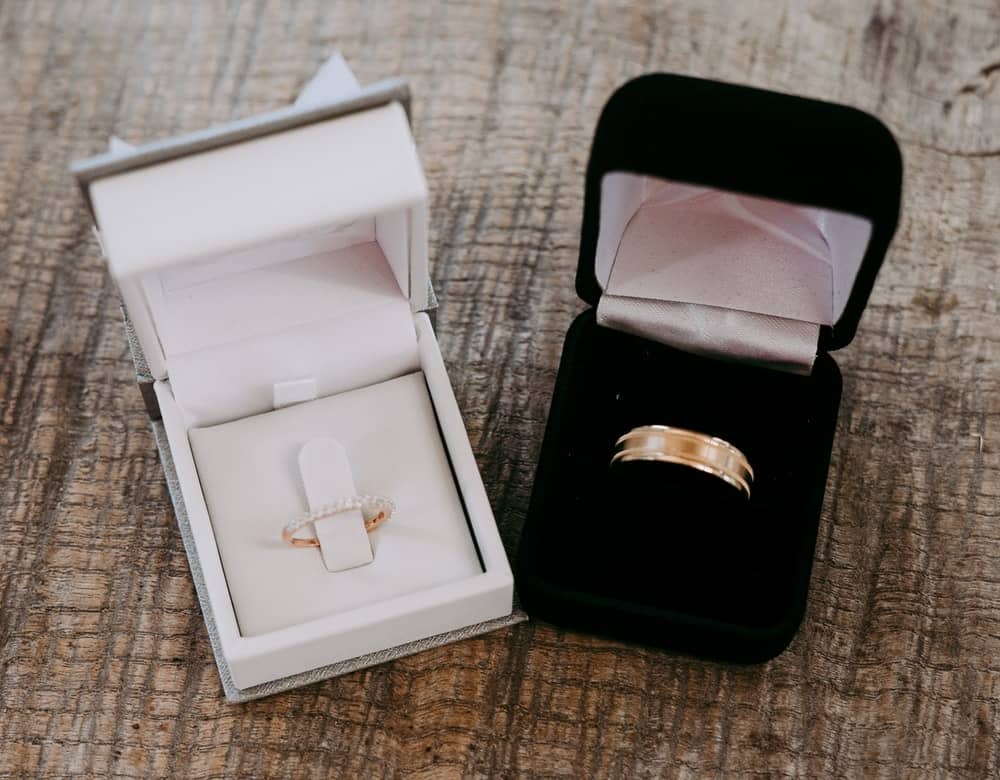
What’s the central symbol of a proposal? It is usually when the man is sitting on one of his knees and pulls out a ring box with a sparkling diamond on top.
Well you’re right. This is what usually happens in the west and is somewhat in the centrepiece of western proposals but in modern Japanese engagements, it is less likely to happen.
I’d always noticed that the Japanese married women wear only one ring which quite often confused me as I was then related and much familiar with the western culture.
So I asked my friend Miko if they received an engagement ring.
Miko told me that they do wear engagement rings during the engagement ceremony but when they get married, they replace it with their wedding bands and keep the engagement rings at home.
Miko also said that the Japanese only wear wedding rings when they go to special events or attend important occasions like someone’s wedding.
This is one of the self-made traditions.
Miko did this during her engagement period also, as she said she didn’t wear it everyday but when she needed to go out once a week for special events like visit a museum or attend a ballet program.
Although everyone I surveyed thought that it is important to wear an engagement ring, the majority of my friends I surveyed did not receive it in the first place.
Related: Here’s how the Hinamatsuri Girl’s Day is celebrated, check out!
- Traditional Japanese Engagement Ceremonies
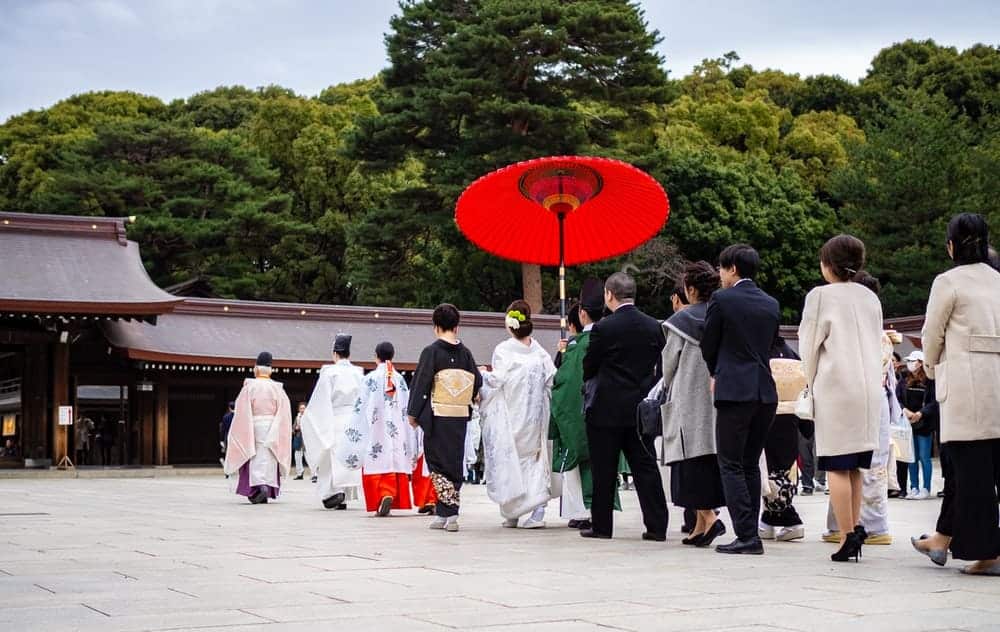
As the tradition has changed (much in the west than in Japan) so has marriages and proposals.
There are a few Japanese who want to do things their own way, there also exist a few who want to follow traditional norms and have hung around them.
In the west, there’s mostly a casual party for engagement after the proposal to celebrate with friends and family. It is called yuino (結納) in Japan.
Yuino is a traditional Japanese ceremony where the families meet and exchange symbolic gifts including dried seafood, fans, hemp, ropes and often money to well-wish for the couples.
Some of the interviewees have held this ceremony and say that it’s pretty common especially in the rural areas.
Even if there isn’t a grand party, there’s always dinner with family with or without gift exchange.
Omiai (お見合い), another tradition that is only occasionally practiced these days to find a marriage partner.
This is actually a formal set up of match making wherein if the partner wants to marry, it acts as a go-between to arrange an engagement party.
Keiko was my only friend who I surveyed, met his husband this way, in an otherwise modern relationship. They dated for a year before he asked her to marry him.
They were engaged for another year and then held a yuino party a few months before their wedding. How are marriage proposals and engagement different in Japan? Well, now you get it right?
- Engagement Courtship Period is Usually One Year In Japan
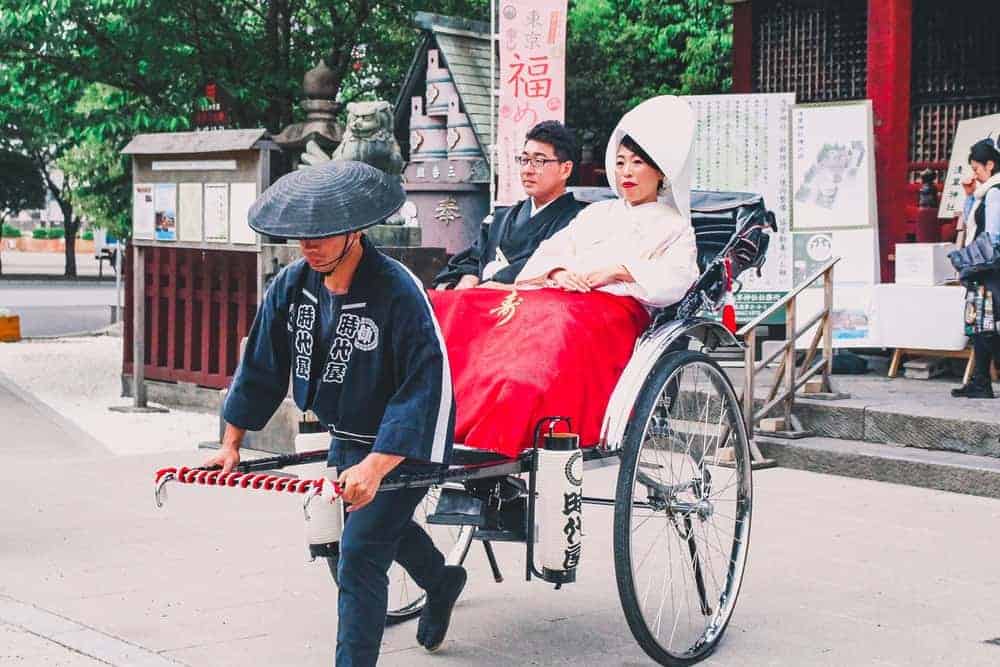
In between Keiko’s engagement and marriage there was a courtship period of one year before she married her boyfriend. This tradition is not usually common in the west. They marry in less than a year of being engaged.
Two of my interviewee friends had a year-long courtship and two of them were engaged for 4 and 5 months respectively. One had a longer courtship period of about 2.5 years.
People in Australia are often engaged to their partners for years and years before they actually marry each other.
Courtship is an important thing to keep in mind if you have thoughts like- How are marriage proposals and engagement different in Japan?!
Related: Check out these love hotels you can stay in if you’re planning your honeymoon somewhere in Japan!
How do Japanese traditionally propose?
In traditional Japanese culture, marriage proposals are less theatrical and elaborate compared to Western customs.
The focus is on simplicity, sincerity, and the couple’s mutual decision to marry. Instead of a grand, surprise-filled event, a traditional Japanese proposal is typically a private and intimate moment between the couple.
The proposal process often involves a serious conversation where the partners openly discuss their intentions to marry and their future together.
This straightforward approach emphasizes the importance of open communication and shared commitment between the two individuals. It’s important to note that in Japanese culture, actions and words are often considered more significant than extravagant gestures.
While the traditional approach to proposing in Japan has been more subdued, with the influence of Western culture and media, some Japanese couples may also incorporate elements of Western-style proposals, especially in urban areas or among younger generations.
As with any cultural practice, customs may vary based on personal preferences and regional differences.
However, the fundamental emphasis on sincerity and mutual understanding remains an essential aspect of a traditional Japanese proposal.
How do Japanese people get engaged?
There are two main ways that Japanese people get engaged: through a traditional engagement ceremony called yuino (結納), or through a more modern proposal.
- Yuino ceremony
The yuino ceremony is a formal engagement ceremony that is usually held at the home of the bride’s family. It is attended by both families, and the groom’s family presents the bride’s family with gifts, such as dried seafood, fans, hemp rope, and money. The bride’s family then presents the groom’s family with gifts, such as sake, rice, and tea. The yuino ceremony is seen as a formal way to seal the engagement and to ask for the bride’s family’s blessing.
- Modern proposal
A modern proposal is a more casual affair, and it can be done in any way that the couple feels is appropriate. The man may propose to the woman in a public setting, such as at a restaurant or in a park. He may also propose in a private setting, such as at home or in a quiet place. The proposal is often accompanied by a gift, such as a ring or flowers.
No matter how the proposal is made, it is important that it is meaningful to both partners. The proposal should reflect the couple’s love for each other, and it should be a moment that they will cherish forever.
What is a traditional Japanese engagement gift?
In traditional Japanese culture, when a couple decides to get married, it is customary for the groom’s family to give gifts to the bride’s family as a gesture of goodwill and appreciation. These gifts, known as “yui-no,” are an essential part of the marriage process and symbolize the union of the two families. While the specific items may vary based on regional customs and personal preferences, some common traditional Japanese engagement gifts include:
- Sake: High-quality sake, a traditional Japanese rice wine, is often presented as a symbol of celebration and good fortune. It represents the hope for a prosperous and harmonious future for the couple.
- Sea Bream (Tai): In Japanese culture, sea bream (tai) is considered an auspicious fish associated with celebrations and joyous occasions. It is often given as a gift to express good wishes for the couple’s happiness and well-being.
- Dried Cuttlefish (Surume): Dried cuttlefish is another traditional engagement gift. The word “surume” is a play on words, as it sounds like “shiru-mu,” meaning “to know,” symbolizing the desire for the couple to deepen their understanding and knowledge of each other throughout their marriage.
- Kelp (Kombu): Kelp is often included in the engagement gifts as it represents a wish for the couple to have a stable and lasting marriage.
- Yanagidaru: Yanagidaru is a type of gift box with a rounded top, symbolizing the wish for the couple’s love to grow and flourish like a tree.
- Money Envelope (Goshugi-bukuro): In modern times, it has become common to give a monetary gift in a special envelope called “goshugi-bukuro” instead of traditional items. The amount of money may vary depending on the relationship between the families and their financial situation.
Are engagement rings a thing in Japan?
Yes, engagement rings are a thing in Japan. They are not as common as in Western cultures, but they are becoming more popular.
The traditional engagement ring in Japan is a gold ring with a red stone. However, in recent years, it has become more common for couples to exchange rings with different colors or designs.
The engagement ring is usually given to the bride by the groom during the yuino ceremony (結納), which is a formal engagement ceremony that is usually held at the home of the bride’s family. The yuino ceremony is attended by both families, and it is seen as a formal way to seal the engagement and to ask for the bride’s family’s blessing.
In recent years, there has been a trend of couples exchanging engagement rings before the yuino ceremony.
This is often done as a surprise proposal, and it is becoming more common as Western influences on Japanese culture continue to grow.
The choice of engagement ring is ultimately up to the couple. However, the traditional yuino gifts are a beautiful and meaningful way to celebrate the start of a new chapter in their lives.
How long do Japanese couples date before getting engaged?
According to a survey by Ufufu, a Japanese online retailer that specializes in engagement and wedding rings, the average length of time that Japanese couples date before getting engaged is about 2.5 years.
However, there is a wide range of variation, with some couples dating for only a few months before getting engaged, and others dating for several years.
There are a few factors that can influence how long a Japanese couple dates before getting engaged.
One factor is the age of the couple. Couples who are younger tend to date for shorter periods of time before getting engaged, while couples who are older tend to date for longer periods of time. Another factor is the cultural background of the couple.
Couples who come from traditional Japanese families may be more likely to date for longer periods of time before getting engaged, while couples who come from more Westernized families may be more likely to date for shorter periods of time.
Partners for life!
I hope you’ve gotten the answer to your question- How are marriage proposals and engagement different in Japan and also have gotten an insight into Japanese wedding culture.
If you’re planning to marry the Japanese way, these points mentioned above will help you a lot!
Hope you find the perfect other-half for yourself!
Also Read:


